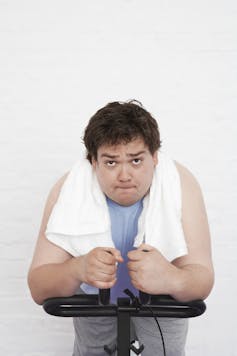Swearing Can Increase Performance of a Task of Physical Strength.
A few years ago my good friend Mark Foulks occupied the rear seat of a tandem on a sponsored long distance cycle ride from Berkshire to Barcelona. His pithily entitled JustGiving website "Berks2Barca", is typical Mark and no uncertainty contributed to him raising more £10,000 towards a mobile chemotherapy unit at the Regal Berkshire Hospital.
Simply it wasn't piece of cake – accessing Barcelona past route from the north involves crossing the Pyrenees by cycling uphill for long stretches of time. He told me that one strategy that evolved spontaneously during these difficult moments was swearing loudly. Only could it really exist that shouting profanities in any way helped him get up that loma? If so, why? As a psychologist interested in understanding swearing I decided to find out.
My enquiry has previously shown that swearing helps people to better tolerate pain, apparently because swearing triggers the body'south acute stress response. Indeed, this research demonstrate that repeating a swear word during an water ice water challenge produces an increment in heart rate, consistent with an aroused autonomic nervous organization as seen during moments of astute stress.
This aforementioned phenomenon is sometimes talked about as the "fight or flight" response and is well known to incorporate a range of elevated bodily responses. 1 example is the release of endorphins, which contributes to a phenomenon known as stress-induced analgesia – potentially explaining why swearing reduces pain.
But one feature of the fight or flying response is the release of adrenaline, which can pb to increased physical performance. This raises the intriguing question every bit to whether swearing while performing a physical claiming might improve performance by triggering the fight or flight response in like mode to what happened in our swearing and pain research.
'Hell on wheels' experiment
To find out, my colleague David Chiliad Spierer and I asked volunteers to ride a stationary wheel in what is known equally the Wingate Exam. Later on warming upwardly, the passenger is asked gradually to build up to top speed, at which moment a switch is flipped calculation huge resistance so that the side by side xxx seconds of exertion resembles hell on wheels. It's a tough claiming to button very hard under these circumstances and airsickness is not uncommon during or presently afterwards.
In this study participants performed the Wingate Test twice – on one occasion repeating a swear word during that 30 seconds of loftier intensity, and on another occasion repeating a neutral give-and-take. Interestingly, volunteers produced a 4.half-dozen% increment in peak power (power exerted during the first five seconds) and a 2.viii% boost in average power when swearing.
However, in that location were no biological signs of the fight or flight response, which we had anticipated would underlie these performance increases. Indeed, several measures of heart rate showed no deviation across the swearing and not-swearing conditions. This was a puzzle – nosotros had an effect but no explanation for it.
Thinking that perhaps the enormous exertion required during the Wingate Examination may have obscured meaningful heart-rate data, we ran a 2d study using the more sedate physical claiming of a hand-grip chore. But this study showed the same pattern of results. Now we found an 8.two% increase in grip strength when participants swore while undertaking the task. However, once once more, there were no physiological signs of the fight or flight response.
The results of both studies are to be presented on May 5 at the British Psychological Lodge Annual Briefing, and have been submitted to Psychology of Sport and Practise.
Psychological caption
Nosotros feel fairly sure that whatever is causing this consequence of swearing on physical performance is not related to fight or flight mechanisms. Only if the upshot isn't physical, it's intriguing to try and piece of work out what psychology may exist at play.

It may be that our studies are simply detecting the effects of "letting become" – where any concerns that overexertion may cause injury or embarrassment become more hands put aside. This would be thanks to an "I don't intendance" mindset brought about by swearing. If true then swearing might besides be expected to amend performance of non-force based concrete tasks such equally balancing, and perhaps even cognitive performance. Watch this space.
What our new studies do prove, without explaining it, is that repeating a swear word enables higher degrees of physical exertion compared with repeating a non-swear give-and-take. And then, at least for now, it seems that science was indeed on the side of my friend Marking during his difficult times in the Pyrenees.
Source: https://theconversation.com/swearing-can-help-you-boost-your-physical-performance-77124
0 Response to "Swearing Can Increase Performance of a Task of Physical Strength."
ارسال یک نظر